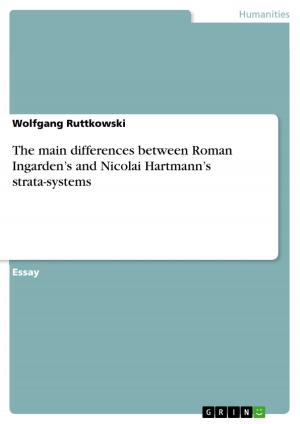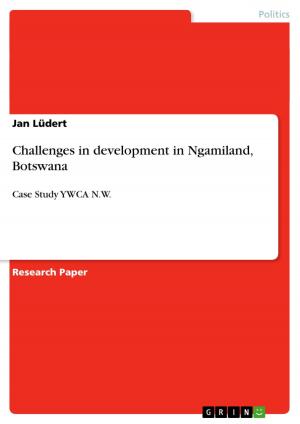Shared sovereignty and denationalisation of statehood in the European Union
Has Governance eclipsed Government?
Nonfiction, Social & Cultural Studies, Political Science| Author: | Fabrizio Capogrosso | ISBN: | 9783640262533 |
| Publisher: | GRIN Publishing | Publication: | February 6, 2009 |
| Imprint: | GRIN Publishing | Language: | English |
| Author: | Fabrizio Capogrosso |
| ISBN: | 9783640262533 |
| Publisher: | GRIN Publishing |
| Publication: | February 6, 2009 |
| Imprint: | GRIN Publishing |
| Language: | English |
Seminar paper from the year 2008 in the subject Politics - International Politics - Topic: European Union, grade: 1,3, European University Viadrina Frankfurt (Oder), 51 entries in the bibliography, language: English, abstract: Although the process of globalisation is an old-dated phenomenon, which can be settled back to the first intercontinental commercial exchanges (cf. Streeck 2005), only recent events have modified the traditional relation among nation-states. The collapse of the Berlin wall and the downfall of the USSR, the growth of the Pacific Asian economies and the expansion of new communication systems have dissolved the conventional threefold partition of the globe in the idea of a 'one world' structured on an axis organised in three principal regional blocks: North America, Western Europe, and Pacific Asia (cf. Taylor/ Flint 2000:4-5). Globalisation has altered all core tasks of the nation-state concerning territoriality, taxation and citizenship. The formulation of policies has shifted from the national context to a complex environment, which embraces the regional and international dimension. These circumstances have affected the representative role of the state as decisional system and have led to a situation, in which sovereignty is shared among multiple actors, who have to deal with new sources of legitimisation beyond the domestic environment (cf. Luhmann 1994:15-20). Thus, traditional foundations for the political order are destabilized due to the fact that 'vertically organised national cultures and national economies are gradually being replaced by new horizontal and global networks' (van Ham 2001:37-8). From this angle, the European Union (hereafter also EU or Union) could be conceived as a regional answer to the process of globalisation, in which European integration is adapting European societies, economies and political organisations to a globalised competitive rule system (cf. van Ham 2001). Nevertheless, if the understanding of the EU as a regional variant to globalisation explains the necessity of European integration, it leaves ground for questions regarding the changes in the relationship between governance and government. Moreover, assumed that European integration, owing its intergovernmental bias, is chiefly managed by national executives (cf. Moravcsik 1993), a multi-level system of governance undermines the core functions of governments as principal linkage between the institutional level of decision-making and the society (cf. Poguntke 2000). In this dissertation I will evaluate, at the example of the European Union, the hypothesis that governance has eclipsed government. The intention is to analyse if the European decisional system has destabilized the role of national governments and eroded the classical link between national institutions and society. Furthermore, I will analyse to which degree these supposed changes are to be ascribed to the institutional configuration of the European Union.
Seminar paper from the year 2008 in the subject Politics - International Politics - Topic: European Union, grade: 1,3, European University Viadrina Frankfurt (Oder), 51 entries in the bibliography, language: English, abstract: Although the process of globalisation is an old-dated phenomenon, which can be settled back to the first intercontinental commercial exchanges (cf. Streeck 2005), only recent events have modified the traditional relation among nation-states. The collapse of the Berlin wall and the downfall of the USSR, the growth of the Pacific Asian economies and the expansion of new communication systems have dissolved the conventional threefold partition of the globe in the idea of a 'one world' structured on an axis organised in three principal regional blocks: North America, Western Europe, and Pacific Asia (cf. Taylor/ Flint 2000:4-5). Globalisation has altered all core tasks of the nation-state concerning territoriality, taxation and citizenship. The formulation of policies has shifted from the national context to a complex environment, which embraces the regional and international dimension. These circumstances have affected the representative role of the state as decisional system and have led to a situation, in which sovereignty is shared among multiple actors, who have to deal with new sources of legitimisation beyond the domestic environment (cf. Luhmann 1994:15-20). Thus, traditional foundations for the political order are destabilized due to the fact that 'vertically organised national cultures and national economies are gradually being replaced by new horizontal and global networks' (van Ham 2001:37-8). From this angle, the European Union (hereafter also EU or Union) could be conceived as a regional answer to the process of globalisation, in which European integration is adapting European societies, economies and political organisations to a globalised competitive rule system (cf. van Ham 2001). Nevertheless, if the understanding of the EU as a regional variant to globalisation explains the necessity of European integration, it leaves ground for questions regarding the changes in the relationship between governance and government. Moreover, assumed that European integration, owing its intergovernmental bias, is chiefly managed by national executives (cf. Moravcsik 1993), a multi-level system of governance undermines the core functions of governments as principal linkage between the institutional level of decision-making and the society (cf. Poguntke 2000). In this dissertation I will evaluate, at the example of the European Union, the hypothesis that governance has eclipsed government. The intention is to analyse if the European decisional system has destabilized the role of national governments and eroded the classical link between national institutions and society. Furthermore, I will analyse to which degree these supposed changes are to be ascribed to the institutional configuration of the European Union.















